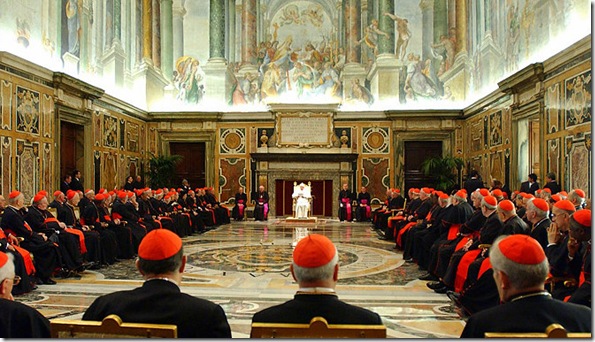Every institution has its problems and conflicts. It is part of the fallen human condition to create on-going clashes between people, offices, and services that should work together. Sin is also able to create evil structures that manipulate and maneuver colleague against colleague, friend against friend, etc. The Church is no exception. Since its inception and until the Lord Jesus’ second coming the Church will also be a place of on-going inner conflicts. Martin Luther’s definition of the Christian as simul iustus et peccator (i.e. righteous and sinner at the same time) also applies to the church as the body of Christ. The problem is that when the Church becomes something else other than what is supposed to be, its operations are often affected for the worse.
Having said that, what on earth is happening at the Vatican? In the last few weeks and months, the Vatican has come out more than ever in recent times as a place of nasty power games between cardinals, wars between ecclesiastical groups, and mounting tensions around the Pope himself. The (lack of) spirituality of the Vatican’s governance has become evident and many observers have easily pointed out the ultimate showdown that is happening there. Leaving aside the moralistic tendency to judge (if any organization is without sin, let it be the first to throw a stone, John 8:7), what can be said about this last outbreak of opaque Vatican affairs?
The Secretary of State in Question
The recent facts touched on a variety of people and issues. The President of the Vatican Bank (i.e. The Institute for Works of Religion) was unexpectedly fired in a very hurried procedure. As an aside, the Vatican Bank has been historically involved in questionable financial affairs due its “secret” policies. The fired president had been given the task of putting the bank on the “white list” but apparently he wanted more transparency that other officials were comfortable with.
Then, various correspondence was leaked from Vatican offices – even from the papal apartment! – and given to the press. An instant book was soon published in Italy containing all these letters and is now the top best seller. An intriguing spy story emerged which could have been written by a professional novelist of the kind of a Dan Brown. The Pope’s butler was arrested but it is evident that he did not act alone, nor on his own. Police investigations are taking place concerning just how may “crows” are hidden in the Vatican, i.e. people that are skillfully maneuvering the leaking of documents for the purpose of attacking others. An atmosphere of suspicion reigns in and outside the Vatican. Historically Vatican policy has been that of secrecy, not of transparency. The inner movements and operations have been covered under the interests of the system. Now some of the schemes are being revealed to the public and Jesus’ words serve as a helpful reminder: “There is nothing concealed that will not be disclosed, or hidden that will not be made known” (Luke 12:2).
Various commentators have suggested some interpretative keys for what is happening. For some this is an entirely “Italian” scandal within the Vatican, i.e. a political game that resembles the dirty politics of the nearby state. Others think that all these moves are most likely related to the next conclave, i.e. the future election of the new Pope. Since Benedict XVI (now 85 years old) is about to nominate other cardinal-electors, various people in the curia are positioning themselves and fighting against opposing parties in order to influence the Pope in his decisions. However, the most plausible and over-arching explanation has to do with the present Secretary of State, cardinal Tarcisio Bertone. His role is like the one of the Prime Minister. Although he has been a long-time friend of Ratzinger, he does not come from the “diplomatic” school and his methods of leadership are recognized as unusual for a Vatican Secretary of State. Curial opposition to Bertone has become more and more vocal and is the background. Apparently, Benedict XVI has no intention of removing Bertone from office, so nobody knows what will happen in the near future. The overall picture is decadent and opaque and will have the probable effect of nurturing people’s skepticism and cynicism.
A More Radical Question
Perhaps the Catholic Church’s fundamental challenge grows out of the reality that the Vatican is a state, a Church-State with a government, departments, a bank, diplomats, etc. The crucial question is: does the Church need to own a bank in order to operate its charities? Does the Church need to be a state in order to fulfill its biblical mission? Does the Church need an empire-like apparatus to be faithful to its missionary calling?
These features lie at the heart of the Vatican, but, are they unnecessary add-ons to the Church? The Church is not a state, nor does it need to parrot states that have banks, soldiers and diplomats. Most commentators, even the most astute and intelligent ones, read and interpret the recent Vatican news without asking these basic questions that are spiritual in nature. Christians should instead try to assess reality with the “mind of Christ”. Without a hint of moralistic superiority, everyone concerned with growing in Christ should take the following exhortation as his program: “Let us throw off everything that hinders and the sin that so easily entangles” (Hebrews 12:1). Since the time of the Roman Empire, the Vatican has been accumulating imperial features that have morphed the Church into something different. Will it be willing to throw them off for the sake of the Gospel?
The real issue is not about crows or leaks or conspiracies. The bottom line question is: where is the Church of Jesus Christ in all this?
Leonardo De Chirico
leonardo.dechirico@ifeditalia.org
Rome, 6th June 2012





